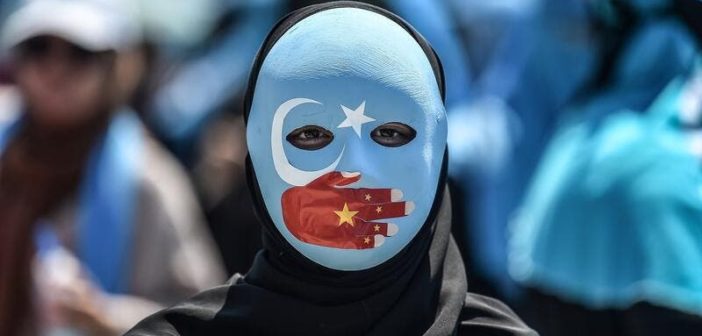By: Mariana Navarrete, Contributing Writer
The Uyghur people, a Muslim ethnic minority in the People’s Republic of China, have been facing mass surveillance and detentions in the autonomous region of Xinjiang. While Muslim countries remain silent and Western countries accuse China of human rights abuse, the internment camps have reached a million Uyghurs detained.
A retired Professor of history at Saint Leo University, Dr. Jack McTague, is one of the few Americans who have visited Xinjiang. McTague traveled there to study the Silk Road.
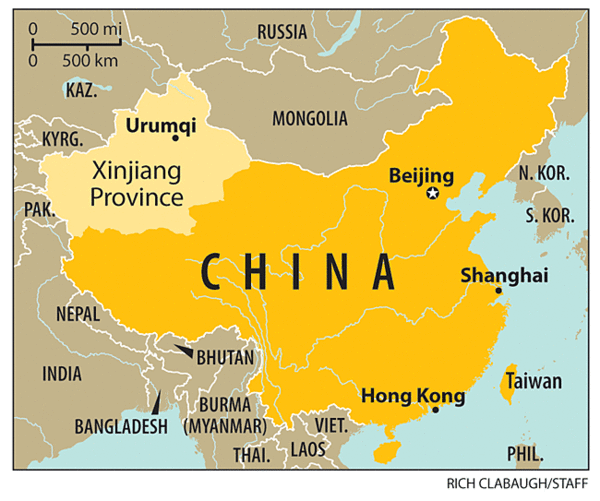
The location of Xinjiang.
“What I noticed was that it didn’t seem like it was part of China,” said McTague. “It seemed very, very different from the rest of China. The Uyghurs are not ethnically Chinese people; they are more related to the Turks, and they do not practice Confucian ideas like the Chinese.”
McTague explained that the Uyghurs lived in the Xinjiang region 1,000 years before China annexed it in the mid-18th century. It had significant cities that were important trade hubs from the Silk Road. Today, more than half of the population in this region of China is Uyghur.
Since 2017, the Uyghur ethnic minority has been detained in internment camps. The World Uyghur Congress claims that the detainees are forced to undergo political indoctrination classes aimed to erode their religious, cultural, and ethnic identities. People sent to the centers are not presented with a warrant, evidence of a crime, or any other documentation.
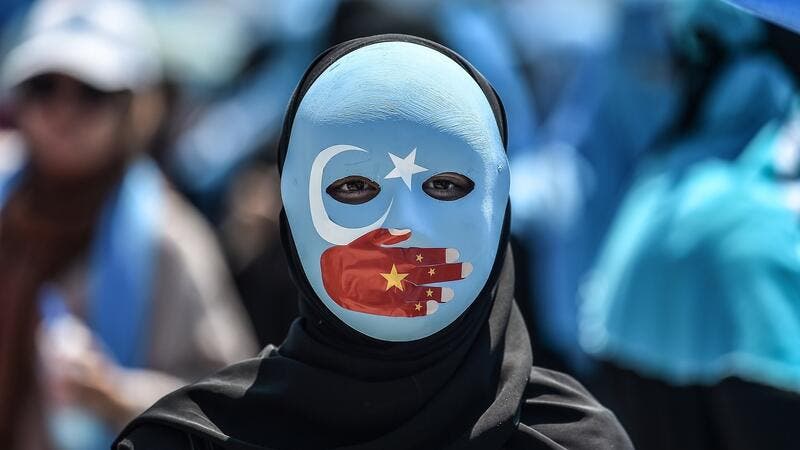
The Uyghurs’ loss of freedom in China has left them a loss of hope.
McTague explained how the internment camps are more like concentration camps.
“What they are trying to do is to make them into something that they’re not,” said McTague.“They are being brainwashed to give up their culture and try to become Chinese.”
In addition to being brainwashed, an investigation by the Associated Press confirms that Uyghurs and other ethnic minorities have been subject to forced contraception, abortions, sterilizations, and arrests or fines for having too many children. Nevertheless, Chinese officials have denied these claims and insist that the internment camps are to assimilate the Uyghurs and maintain social stability.
The International Consortium of Investigative Journalists, via a chain of exiled Uyghurs, released several telegrams from the Communist Party commission in charge of Xinjiang’s security apparatus with an operations manual for running the detention camps. The telegrams emphasize that the centers are a counterterrorism tactic, and their main objective is to promote long-term social stability in Xinjiang.
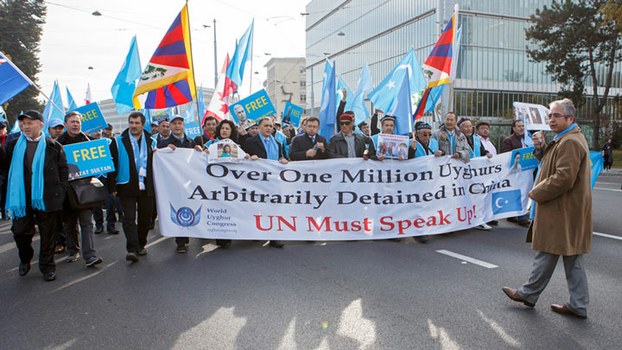
Uyghurs around the world seek justice for their people.
The telegrams say that people inside the camps have to adhere to daily studies of Mandarin, Chinese law, and skills. It is strictly forbidden for police to allow escapes, trouble, staff attacks, unnatural deaths, food safety incidents, and major epidemics. They must ensure that the training centers are absolutely safe and free of risk.
It is also stated in the leaked documents that, after the “students” are released, they must be in sight for at least one year to make sure that their performance and reestablishment in the Chinese society has excelled and they have not been involved in any act of terrorism.
According to reports from Beijing, since 2014, Xinjiang authorities have “destroyed 1,588 violent and terrorist gangs, arrested 12,995 terrorists, seized 2,052 explosive devices, punished 30,645 people for 4,858 illegal religious activities, and confiscated 345,229 copies of illegal religious materials training.”
The China director at Human Rights Watch, Sophie Richardson, said in an interview that the Chinese government’s statement and accompanying footage from inside the centers are pure propaganda.
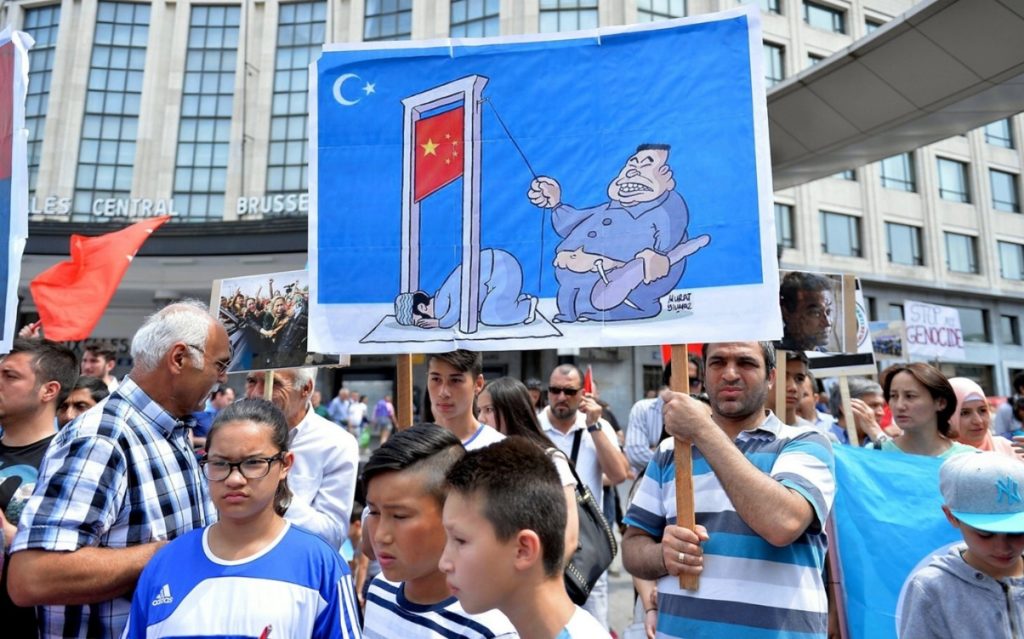
Protests against China’s policy of repression of the Uyghurs.
“They are holding people at these ‘political education’ centers not because they have committed any crimes, but because they deem them politically unreliable,” said Richardson.
A Professor of political science and international studies at Saint Leo , Dr. Marco Rimanelli, claims that the Chinese focus on the domestic market has influenced Uyghur repression.
“The economic growth of Xinjiang is slow, and it is based on exploiting coal,” said Rimanelli. Hence, the Chinese government needs control of the coal, and the Uyghurs are getting in their way.
Rimanelli emphasizes that China has expanded its influence in other countries lending money. China has become more active and an influential voice at the United Nations because so many countries benefit from billions of dollars in Chinese investments through its “Belt and Road” infrastructure program.
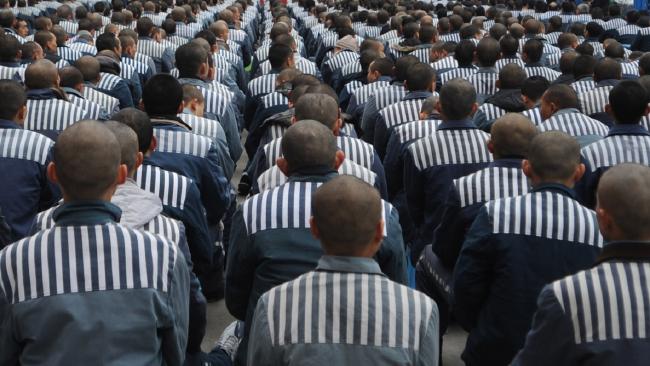
The Xinjiang internment camp is more like a concentration camp.
Saudi Arabia, Russia, and 35 other countries have written to the United Nations supporting China’s repression policies in its western region of Xinjiang, according to a copy of the letter seen by Reuters in 2019, in contrast to strong Western criticism.
Meanwhile, the Uyghurs that can flee from Xinjiang undoubtedly do so with accumulated resentment and loss of hope.
Extensive Associated Press interviews highlight some Uyghur activists’ daily battle against the radicalization of their people, who live or have lived massive surveillance and constant fear of arrest in China. Several thousand Uyghur men, women, and children are estimated to have crossed the border to join the Turkistan Islamic Party (TIP), an ethnic Uyghur militia allied with al-Qaida on the front lines of the fighting.
“We are losing the deradicalization battle,” said Seyit Tumturk, a Uyghur activist, in an interview with the Associated Press. “Why? Because we cannot convince our people that hope and human rights exist in the world.”

